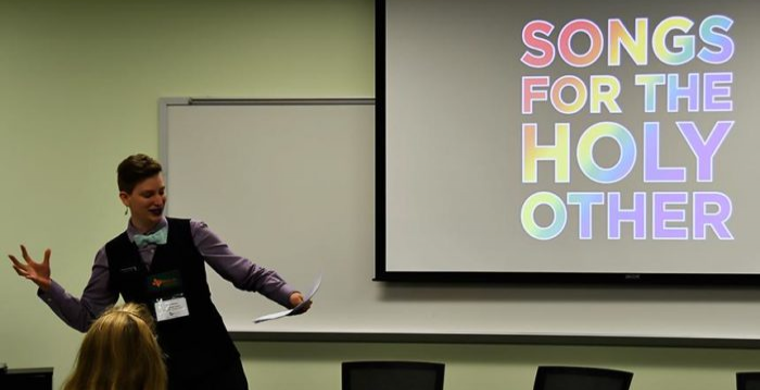Hymn Society Releases "Queer Hymns" for LGBTQIA2S+
A collection comprised of nearly 50 "queer hymns" has been recently published by an ecumenical non-profit association that seeks to promote congregational singing.
By Jeff Walton
https://juicyecumenism.com/2019/10/29/queer-hymns/
October 29, 2019
Songs for the Holy Other: Hymns Affirming the LGBTQIA2S+ Community was released in July by the Hymn Society in the United States and Canada.
Anglican Journal, the publication of the Anglican Church of Canada, publicized the songs, which were promptly shared online by the U.S.-based Episcopal Church. Both of the neighboring churches regularly promote LGBT causes throughout the worldwide Anglican Communion, but some of the hymns trample on a number of core Christian teachings, in addition to revisionist gender identity and human sexuality.
Among the offered musical compositions are: "A Hymn for Self-Acceptance", "God Calls You Good", "God of Queer Transgressive Spaces" and "The Kingdom of God is the Queerest of Nations".
Many of the songs promise indiscriminate inclusion regardless of personal choices, praise alphabet-soup sexuality as part of God's intended design, and conflate romantic love with brotherly or familial love.
The entire collection is viewable in PDF form here. https://thehymnsociety.org/wp-content/uploads/2019/07/Songs-for-the-Holy-Other-FINAL-7-10-19.pdf
Anglican Journal frames the release of the hymns immediately following the July General Synod in which Canadian Anglicans narrowly defeated an amendment to the marriage canon that would have recognized same-sex marriage. Many Canadian Anglican churches already participate in same-sex rites (the Diocese of Toronto has a bishop in a same-sex union) but the church's canon law defines marriage as between a man and a woman.
Praise for the new music is offered by an Anglican church music director from Ontario "who identifies as gender-non-conforming, queer and asexual."
"Don't let the doctrines of our churches use the Word to misconstrue," A Hymn for Self-Acceptance reads, "for it's written in the scriptures, surely God delights in you!"
Some of the hymns call into question whom the object of praise is; many feature self-lionizing language. The hymn Alchemy of Healing does not mention God, instead praising courage and strength as the singer offers blessing.
We'll Build a World similarly proclaims a utopia brought about by human means: "together hand in hand, we'll create that promised land."
Still other hymns focus upon gender fluid identity.
"Our genders may seem fixed, but even these may change as we find beauty in-between that may at first seem strange," reads the hymn As Colors in the Sky. Another hymn, God Loves Us in Mysterious Ways groups gender alongside class and race as "deep, confining tombs." The gender-bending is transposed upon God himself: "God of many genders, our world reflects you," reads God of Many Faces.
Some of the hymns embrace mind-body dualism, "Shedding Clouds of flesh and gender," begins one stanza of God of Queer Transgressive Spaces.
Some of the most cringe-worthy hymns do not specifically mention sexuality, but offer bland indiscriminate affirmation. The syrupy God Calls You Good directly conflicts with scriptural admonitions that "no one does good, not even one."
One hymn, Pour Your Freedom Over Me, makes no mention of God but reads like something from a Robert Jeffress flag-draped worship of America: "Hand in hand let's make a chain, and together proclaim, Land of the brave, home of the free, Pour your freedom over me," it reads.
Not all of the hymns are cotton candy fluff: Christ Our Health, originally composed in 1984 for those afflicted with AIDS, identifies Christ as the root of victory. Use of words like contagion, infection and immunity seem forced (especially when describing Christ) but there are genuinely good lines: "Christ for now and Christ for ages, Christ who lives in plague and pain, Chris upon a cross courageous, Christ who died shall forever reign," reads one stanza.














